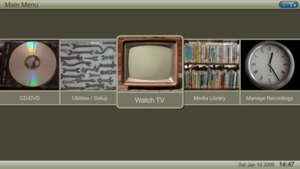Media center facts for kids
A media center is like a special computer or program that helps you play all your favorite entertainment. Think of it as a central hub for your music, movies, and photos. It's often connected to your living room TV and controlled with a remote control. Sometimes, people call a computer set up this way a "HTPC" or "Media PC."
A media center lets you watch movies from DVDs, Blu-ray discs, or digital files. You can also watch and record TV shows, and listen to music from CDs or digital files like MP3s. The media can be saved on a hard drive or shared from other devices on your home network. You can also stream content from the internet. Some media centers can even find news for you! They are designed to be easy to use with a remote, even from across the room.
You can buy a media center already built, or you can turn a regular computer or even some video game consoles, like a PlayStation 3 or Xbox 360, into one. These consoles often have basic media center features built-in.
What Can a Media Center Do?
Media centers bring together all your entertainment in one place. They are designed to be simple to use, often with a GUI (Graphical User Interface) that looks good on a TV screen. You can control it with a remote or a wireless keyboard.
Here are some cool things a media center can do:
- Watch TV: It can receive and play different types of TV, like regular TV, digital TV, or even TV from the internet.
- Connect to the Internet: You can get online for things like email or web browsing.
- Play Media Files: It can play digital music, movies, and photos from various sources.
- Store Your Stuff: You can save all your digital media files, usually on a large hard drive.
- Connect to Your TV/Speakers: It plays your media through your regular TV or sound system.
- Simple to Use: They are often easier to set up and use for entertainment than a full computer.
- Save Money: Sometimes, they can be cheaper than buying many separate devices.
- Easy to Move: Some media centers are small and easy to take with you.
Even though media centers use parts similar to regular computers, they are often smaller. They might also have special parts like TV tuners or remote control receivers. While not super common everywhere, they are becoming more popular in places like the UK and the United States.
Where Are Media Centers Used?
Media centers are great for playing digital media without needing a full computer. They are smaller, less complicated, and often cost less than a PC set up for the same tasks.
Here are some common places you might find media centers:
- Digital Signs: Like the screens you see in stores showing ads.
- Car Entertainment: In fancy cars, limousines, or tour buses for movies and music.
- In-flight/Room Entertainment: On airplanes or in hotel rooms, letting you choose movies or shows.
- For Travelers: People who travel a lot can carry their whole collection of movies and music with them.
Related pages
- Home theater PC
- 10-foot user interface
- Digital media receiver
- Media server
- Home cinema
- Small form factor
- Graphical user interface
- Skin


